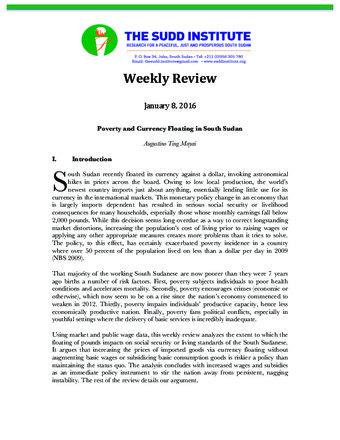Poverty and Currency Floating in South Sudan
Publication Summary
South Sudan recently floated its currency against a dollar, invoking astronomical hikes in prices across the board. Owing to low local production, the world’s newest country imports just about anything, essentially lending little use for its currency in the international markets. This monetary policy change in an economy that is largely imports dependent has resulted in serious social security or livelihood consequences for many households, especially those whose monthly earnings fall below 2,000 pounds. While this decision seems long overdue as a way to correct longstanding market distortions, increasing the population’s cost of living prior to raising wages or applying any other appropriate measures creates more problems than it tries to solve. The policy, to this effect, has certainly exacerbated poverty incidence in a country where over 50 percent of the population lived on less than a dollar per day in 2009 (NBS 2009).
That majority of the working South Sudanese are now poorer than they were 7 years ago births a number of risk factors. First, poverty subjects individuals to poor health conditions and accelerates mortality. Secondly, poverty encourages crimes (economic or otherwise), which now seem to be on a rise since the nation’s economy commenced to weaken in 2012. Thirdly, poverty impairs individuals’ productive capacity, hence less economically productive nation. Finally, poverty fans political conflicts, especially in youthful settings where the delivery of basic services is incredibly inadequate.
Using market and public wage data, this weekly review analyzes the extent to which the floating of pounds impacts on social security or living standards of the South Sudanese. It argues that increasing the prices of imported goods via currency floating without augmenting basic wages or subsidizing basic consumption goods is riskier a policy than maintaining the status quo. The analysis concludes with increased wages and subsidies as an immediate policy instrument to stir the nation away from persistent, nagging instability. The rest of the review details our argument.
Augustino Ting Mayai's Biography
Augustino Ting Mayai is the former Managing Director of the Sudd Institute. He is a founding Research Director of the same institution, serving in this capacity for a decade. He holds a Ph.D. in Sociology, with concentrations on demography and development from the University of Wisconsin-Madison. He currently studies how state effectiveness affects child health outcomes in South Sudan and Ethiopia. Dr. Mayai has written extensively on South Sudan’s current affairs. August is the current Chair (Statistician General) of the National Bureau of Statistics, Government of South Sudan.

